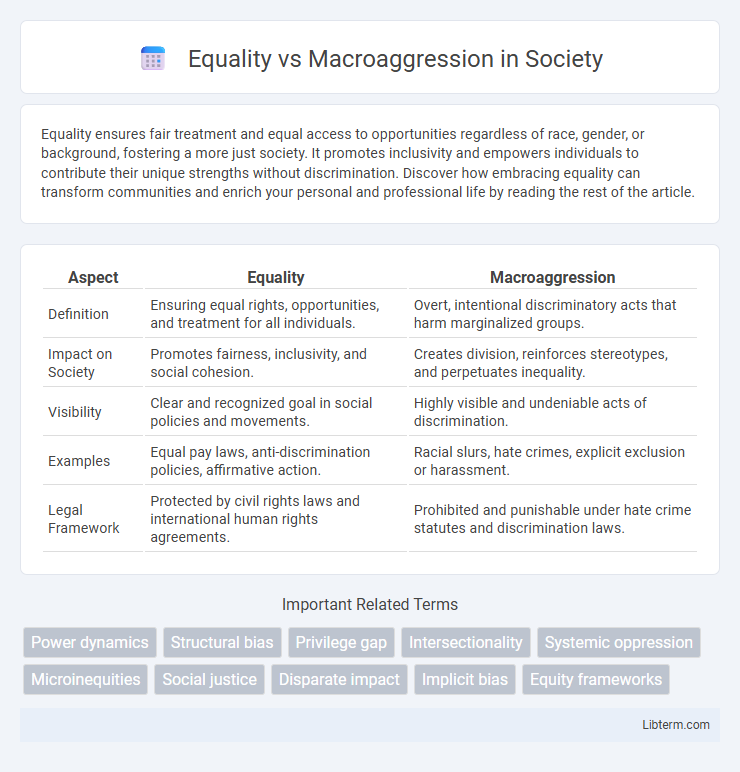Equality ensures fair treatment and equal access to opportunities regardless of race, gender, or background, fostering a more just society. It promotes inclusivity and empowers individuals to contribute their unique strengths without discrimination. Discover how embracing equality can transform communities and enrich your personal and professional life by reading the rest of the article.
Table of Comparison
| Aspect | Equality | Macroaggression |
|---|---|---|
| Definition | Ensuring equal rights, opportunities, and treatment for all individuals. | Overt, intentional discriminatory acts that harm marginalized groups. |
| Impact on Society | Promotes fairness, inclusivity, and social cohesion. | Creates division, reinforces stereotypes, and perpetuates inequality. |
| Visibility | Clear and recognized goal in social policies and movements. | Highly visible and undeniable acts of discrimination. |
| Examples | Equal pay laws, anti-discrimination policies, affirmative action. | Racial slurs, hate crimes, explicit exclusion or harassment. |
| Legal Framework | Protected by civil rights laws and international human rights agreements. | Prohibited and punishable under hate crime statutes and discrimination laws. |
Understanding Equality: Core Definitions
Equality involves ensuring equal rights, opportunities, and treatment for all individuals, regardless of race, gender, or socioeconomic status. Core definitions emphasize fairness, nondiscrimination, and the removal of barriers that create disparities. Understanding equality requires recognizing systemic structures that perpetuate inequality and actively promoting inclusivity and equity in all social, educational, and professional contexts.
What is Macroaggression?
Macroaggressions are large-scale, overt acts of discrimination or hostility directed at marginalized groups, often embedded in institutional policies and societal norms. They differ from microaggressions, which are subtle, often unintentional slights or insults. Understanding macroaggressions is crucial for addressing systemic inequality and promoting social justice.
Historical Context of Equality Movements
Historical equality movements trace back to struggles for civil rights, women's suffrage, and labor laws, aiming to dismantle systemic discrimination embedded in legal and social frameworks. These efforts highlight how entrenched inequalities have triggered macroaggressions--widespread, often unintentional acts of dominance by privileged groups. Understanding these movements reveals the persistent challenges in achieving true equality and the ongoing need to address macroaggressions within social institutions.
Macroaggressions in Everyday Interactions
Macroaggressions manifest in everyday interactions through subtle but persistent behaviors that communicate bias or discrimination, often targeting marginalized groups. These actions, whether verbal, nonverbal, or environmental, perpetuate inequality by reinforcing stereotypes and undermining the dignity of those affected. Recognizing and addressing macroaggressions is essential to fostering inclusive environments that promote true equality.
Equality and Social Justice: Bridging the Gap
Equality in social justice aims to provide all individuals with equal access to rights, opportunities, and resources, addressing systemic disparities that fuel inequality. Bridging the gap requires recognizing and dismantling macroaggressions--systemic, overt, and covert behaviors that perpetuate discrimination and marginalization. Emphasizing equity over mere equality fosters inclusive policies that account for historical and structural disadvantages, promoting genuine social justice for marginalized communities.
The Psychological Impact of Macroaggressions
Macroaggressions cause significant psychological distress by undermining an individual's sense of belonging and self-worth, often leading to anxiety, depression, and chronic stress. Unlike overt discrimination, these subtle, often unintentional actions erode mental health over time through repeated exposure. Addressing the psychological impact of macroaggressions is crucial for fostering genuine equality and creating inclusive environments.
Equality vs. Equity: Knowing the Difference
Equality means providing the same resources and opportunities to everyone, while equity involves distributing resources based on individual needs to achieve fair outcomes. Understanding the difference between equality and equity is crucial to addressing macroaggressions, which often arise from systemic inequalities and biases. Implementing equity-focused approaches helps dismantle barriers, ensuring marginalized groups receive tailored support that promotes genuine inclusion and social justice.
Addressing Macroaggressions: Strategies and Solutions
Addressing macroaggressions requires implementing comprehensive training programs that raise awareness about subtle, often unintentional discriminatory behaviors in organizations and communities. Creating safe spaces where individuals can openly discuss experiences of micro- and macroaggressions promotes understanding and healing, fostering inclusive environments. Policies that enforce accountability alongside continuous education ensure sustained cultural change and equitable treatment across diverse populations.
The Role of Policy in Promoting Equality
Policy plays a crucial role in promoting equality by establishing legal frameworks that prohibit discrimination and ensure equal access to opportunities in education, employment, and healthcare. Anti-discrimination laws and affirmative action policies address systemic macroaggressions that marginalize minority groups, fostering a more inclusive society. Effective policy implementation requires continuous evaluation and community engagement to rectify structural inequalities and mitigate subtle forms of bias.
Towards Inclusive Societies: Moving Beyond Macroaggression
Equality emphasizes equal rights and opportunities for all individuals, while addressing macroaggressions requires recognizing subtle, systemic forms of discrimination that undermine inclusion. Moving beyond macroaggressions involves implementing policies and cultural shifts that foster genuine respect, equity, and belonging within diverse communities. Inclusive societies prioritize proactive education, empathy-building, and accountability to dismantle both overt and covert barriers to full participation.
Equality Infographic

 libterm.com
libterm.com